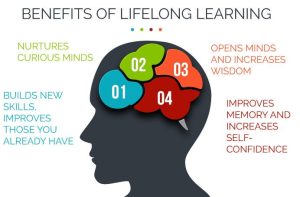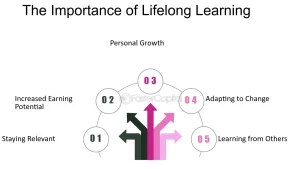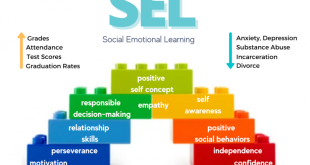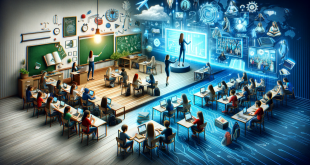In an era characterized by rapid technological advancements, shifting job markets, and an ever-evolving global landscape, the concept of lifelong learning has emerged as a vital necessity. Lifelong learning refers to the continuous, voluntary, and self-motivated pursuit of knowledge for personal or professional development. As we navigate the complexities of the modern world, embracing lifelong learning is more important than ever. This article explores the significance of lifelong learning, its benefits, and practical ways to integrate it into our daily lives.
 The Evolving Landscape of Work
The Evolving Landscape of Work
The nature of work is changing at an unprecedented pace. Automation, artificial intelligence, and digital technologies are transforming industries, rendering some jobs obsolete while creating new opportunities. According to a report by the World Economic Forum, by 2025, 85 million jobs may be displaced due to automation, while 97 million new roles may emerge that require new skills.
Adaptability in the Workforce
In this dynamic environment, adaptability is crucial. Lifelong learning enables individuals to stay relevant in their fields, acquire new skills, and adjust to changing demands. Employees who engage in continuous learning are better equipped to embrace new technologies, methodologies, and practices, making them valuable assets to their employers.
Personal Growth and Fulfillment
Beyond professional development, lifelong learning fosters personal growth and fulfillment. Engaging in new learning experiences can enhance cognitive abilities, improve problem-solving skills, and increase creativity. The pursuit of knowledge can lead to a greater understanding of the world, enriching one’s life experience.
Building Confidence
As individuals learn and master new skills, they often experience a boost in confidence. This newfound self-assurance can lead to greater willingness to take risks, explore new opportunities, and engage in diverse activities. Whether it’s learning a new language, picking up a musical instrument, or pursuing a hobby, each new skill contributes to a sense of accomplishment and personal satisfaction.
The Role of Technology in Lifelong Learning
Technology plays a pivotal role in facilitating lifelong learning. The rise of online courses, webinars, and digital resources has made education more accessible than ever. Platforms like Coursera, edX, and Khan Academy offer a wide range of courses on various subjects, allowing individuals to learn at their own pace and convenience.
The Benefits of Online Learning
- Flexibility: Online learning allows individuals to balance their education with work and personal commitments.
- Diverse Learning Opportunities: From professional certifications to personal interest courses, the variety of available topics caters to diverse learning needs.
- Global Access: Online platforms provide access to knowledge from experts around the world, democratizing education and fostering global connections.
Lifelong Learning and Mental Well-Being
Engaging in lifelong learning has been linked to improved mental health and well-being. Continuous learning stimulates the brain, promoting cognitive function and potentially reducing the risk of cognitive decline as we age. Additionally, the social aspect of learning—whether through classes, workshops, or study groups—can enhance social connections and combat feelings of isolation.
Learning as a Stress Reliever
Participating in learning activities can also serve as a healthy outlet for stress relief. Immersing oneself in a new subject or skill can provide a sense of purpose and distraction from daily pressures. Many individuals find solace and enjoyment in creative pursuits, such as painting, writing, or cooking, which contribute to overall happiness and fulfillment.
Lifelong Learning in Education
The importance of lifelong learning extends to the education system as well. Educators are increasingly recognizing the need to instill a love of learning in students from an early age. By fostering curiosity and critical thinking skills, educators prepare students to become lifelong learners who are equipped to navigate a complex world.
Encouraging a Growth Mindset
Promoting a growth mindset—believing that abilities and intelligence can be developed through dedication and hard work—encourages students to embrace challenges and view failures as opportunities for growth. This mindset is essential for lifelong learning, as it cultivates resilience and a willingness to seek out new experiences.
Practical Ways to Embrace Lifelong Learning
Incorporating lifelong learning into daily life doesn’t have to be daunting. Here are some practical strategies to cultivate a habit of continuous learning:
- Set Learning Goals: Identify specific areas of interest or skills you’d like to develop. Setting achievable goals can provide a clear path to follow.
- Create a Learning Schedule: Allocate dedicated time each week for learning activities. Whether it’s reading, taking an online course, or attending workshops, consistency is key.
- Join Learning Communities: Engage with others who share similar interests. Joining clubs, attending lectures, or participating in online forums can enhance the learning experience through collaboration and discussion.
- Stay Curious: Embrace a curious mindset. Ask questions, seek out new experiences, and explore topics outside your comfort zone.
- Utilize Technology: Take advantage of online resources, podcasts, and educational videos. These tools can provide valuable information and insights at your fingertips.

Conclusion
In today’s fast-paced and ever-changing world, the importance of lifelong learning cannot be overstated. From enhancing career prospects and personal growth to improving mental well-being and fostering adaptability, the benefits of continuous learning are far-reaching. As individuals, we must embrace the mindset of lifelong learners, recognizing that the pursuit of knowledge is a lifelong journey that enriches our lives and prepares us for the challenges ahead.
By actively seeking opportunities to learn, grow, and adapt, we can not only navigate the complexities of the modern world but also thrive in it. In a society that values innovation and progress, lifelong learning remains a cornerstone of personal and professional success.


